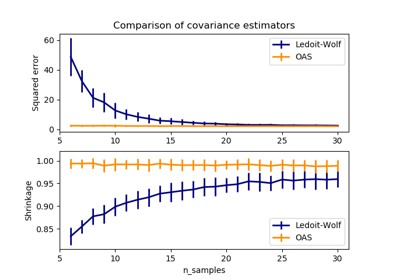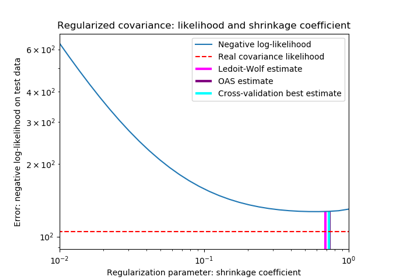sklearn.covariance.OAS¶
-
class
sklearn.covariance.OAS(store_precision=True, assume_centered=False)[source]¶ Oracle Approximating Shrinkage Estimator
Read more in the User Guide.
OAS is a particular form of shrinkage described in “Shrinkage Algorithms for MMSE Covariance Estimation” Chen et al., IEEE Trans. on Sign. Proc., Volume 58, Issue 10, October 2010.
The formula used here does not correspond to the one given in the article. In the original article, formula (23) states that 2/p is multiplied by Trace(cov*cov) in both the numerator and denominator, but this operation is omitted because for a large p, the value of 2/p is so small that it doesn’t affect the value of the estimator.
- Parameters
- store_precisionbool, default=True
Specify if the estimated precision is stored.
- assume_centeredbool, default=False
If True, data will not be centered before computation. Useful when working with data whose mean is almost, but not exactly zero. If False (default), data will be centered before computation.
- Attributes
- covariance_array-like, shape (n_features, n_features)
Estimated covariance matrix.
- precision_array-like, shape (n_features, n_features)
Estimated pseudo inverse matrix. (stored only if store_precision is True)
- shrinkage_float, 0 <= shrinkage <= 1
coefficient in the convex combination used for the computation of the shrunk estimate.
Notes
The regularised covariance is:
(1 - shrinkage) * cov + shrinkage * mu * np.identity(n_features)
where mu = trace(cov) / n_features and shrinkage is given by the OAS formula (see References)
References
“Shrinkage Algorithms for MMSE Covariance Estimation” Chen et al., IEEE Trans. on Sign. Proc., Volume 58, Issue 10, October 2010.
Methods
error_norm(self, comp_cov[, norm, scaling, …])Computes the Mean Squared Error between two covariance estimators.
fit(self, X[, y])Fits the Oracle Approximating Shrinkage covariance model according to the given training data and parameters.
get_params(self[, deep])Get parameters for this estimator.
get_precision(self)Getter for the precision matrix.
mahalanobis(self, X)Computes the squared Mahalanobis distances of given observations.
score(self, X_test[, y])Computes the log-likelihood of a Gaussian data set with
self.covariance_as an estimator of its covariance matrix.set_params(self, \*\*params)Set the parameters of this estimator.
-
__init__(self, store_precision=True, assume_centered=False)[source]¶ Initialize self. See help(type(self)) for accurate signature.
-
error_norm(self, comp_cov, norm='frobenius', scaling=True, squared=True)[source]¶ Computes the Mean Squared Error between two covariance estimators. (In the sense of the Frobenius norm).
- Parameters
- comp_covarray-like of shape (n_features, n_features)
The covariance to compare with.
- normstr
The type of norm used to compute the error. Available error types: - ‘frobenius’ (default): sqrt(tr(A^t.A)) - ‘spectral’: sqrt(max(eigenvalues(A^t.A)) where A is the error
(comp_cov - self.covariance_).- scalingbool
If True (default), the squared error norm is divided by n_features. If False, the squared error norm is not rescaled.
- squaredbool
Whether to compute the squared error norm or the error norm. If True (default), the squared error norm is returned. If False, the error norm is returned.
- Returns
- The Mean Squared Error (in the sense of the Frobenius norm) between
selfandcomp_covcovariance estimators.
-
fit(self, X, y=None)[source]¶ Fits the Oracle Approximating Shrinkage covariance model according to the given training data and parameters.
- Parameters
- Xarray-like of shape (n_samples, n_features)
Training data, where n_samples is the number of samples and n_features is the number of features.
- y
not used, present for API consistence purpose.
- Returns
- selfobject
-
get_params(self, deep=True)[source]¶ Get parameters for this estimator.
- Parameters
- deepbool, default=True
If True, will return the parameters for this estimator and contained subobjects that are estimators.
- Returns
- paramsmapping of string to any
Parameter names mapped to their values.
-
get_precision(self)[source]¶ Getter for the precision matrix.
- Returns
- precision_array-like
The precision matrix associated to the current covariance object.
-
mahalanobis(self, X)[source]¶ Computes the squared Mahalanobis distances of given observations.
- Parameters
- Xarray-like of shape (n_samples, n_features)
The observations, the Mahalanobis distances of the which we compute. Observations are assumed to be drawn from the same distribution than the data used in fit.
- Returns
- distarray, shape = [n_samples,]
Squared Mahalanobis distances of the observations.
-
score(self, X_test, y=None)[source]¶ Computes the log-likelihood of a Gaussian data set with
self.covariance_as an estimator of its covariance matrix.- Parameters
- X_testarray-like of shape (n_samples, n_features)
Test data of which we compute the likelihood, where n_samples is the number of samples and n_features is the number of features. X_test is assumed to be drawn from the same distribution than the data used in fit (including centering).
- y
not used, present for API consistence purpose.
- Returns
- resfloat
The likelihood of the data set with
self.covariance_as an estimator of its covariance matrix.
-
set_params(self, **params)[source]¶ Set the parameters of this estimator.
The method works on simple estimators as well as on nested objects (such as pipelines). The latter have parameters of the form
<component>__<parameter>so that it’s possible to update each component of a nested object.- Parameters
- **paramsdict
Estimator parameters.
- Returns
- selfobject
Estimator instance.


